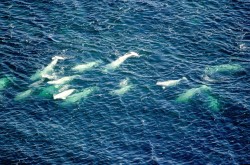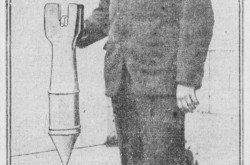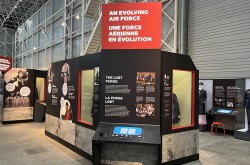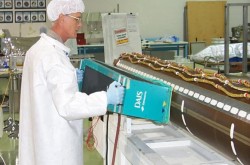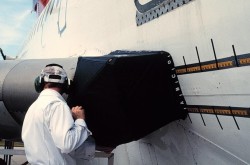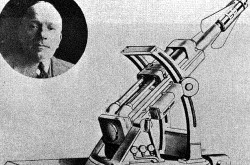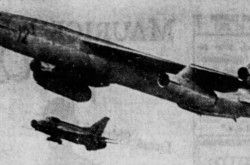Legacy Series Episode 4 - Comrades in Arms
In Episode 4, factory workers and members of various auxiliary forces — including members of the RAF Women’s division, or WAAFs — describe what it was like to support the war effort. From working in aircraft factories to serving as ground crew, their firsthand accounts are shared with gentle humour, bringing history to life in an engaging and often moving way. Topics include Morse Code, plotting the courses of enemy and Allied aircraft, the importance of secrecy, and language misfires.
The interviews are interspersed with archival photographs and film footage. Scenes between Cadet Andy and Captain Johnny C provide context and additional information on what it was like to go to war.
Transcript
0:13
To be working in a field where I could contribute to the war effort—I really felt happy.
0:27
Sending Morse Code was interesting.
0:31
The shift work was a pain, but helping the war effort, that was important to me.
1:55
I worked at a factory in Amherst, and they built the Avro Anson;
2:01
but I ended up in the office, filing stuff.
2:05
The welding part was downstairs on the floor; we could see them.
2:11
And I discovered they were making more money on the floor watching
2:16
and, being nosey, I was all this.
2:20
And I said, “Well it didn’t look hard,” and “What do we do?”
2:24
And we had to take a course in welding.
2:28
And I remember the first night I took it: the guy that was teaching me laid a hot pipe
2:37
down in front of me.
2:39
And I picked it up to put the lugs on, or whatever you call those little things (laughs),
2:44
and I burned my hand and they took me in to the doctor.
2:48
And because my then-fiancé who became my husband,
2:55
he was standing there smiling,
2:58
I think they were trying to make me say something—ouch, or something.
3:03
And I was bound I wasn’t going to show, because if you’re going to work downstairs
3:07
with the guys, you better be brave, you know.
3:10
I think they were just testing my mettle, you know: kind of see how much I could take.
3:16
It might have had to do with what we had to do as women; I don’t know.
3:23
When we took the course, we’d just put our initial, first initial,
3:29
so they wouldn’t know whether we were women or men;
3:34
and they tested us that way, too.
3:39
And they discovered that all the women were passing it more than the men.
3:49
And the explanation they gave, it was something to do with we were used to sewing, and when
3:55
you’re making the weld, we would make it very even,
4:00
where the men would make it bumpy, sort of.
4:03
The men were making sixty cents an hour,
4:08
and the women were only making forty cents an hour.
4:12
And of course they had a union; but of course we weren’t allowed to join it.
4:17
But it never affected our feelings.
4:19
Like, we didn't hate the men.
4:21
We’d just put up with it; it was just part of the world in those days.
4:28
Oh, I suppose some of the boys teased us a lot, maybe,
4:34
we had to wear a white coverall.
4:39
And we hated it.
4:40
I don’t know what you’d call them now: the whole one-piece that workers wear.
4:46
They would always say “Oh you have pink pants on today.”
4:52
Because they would see it through the slit where the pocket was.
4:55
But you just stood up to them, and think of something to do.
5:01
I wouldn’t give him the torch when he wanted it, or something.
5:05
You know, you’d just play little tricks on them.
5:01
I wouldn’t give him the torch when he wanted it, or something.
5:05
You know, you’d just play little tricks on them.
5:07
When I worked at the factory or the bank, the sense of patriotism with me was there,
5:18
because my brother was a mid-upper gunner in a plane.
5:25
And we were very proud of what we were doing—anyone that I knew was.
5:29
I wasn’t terribly concerned about the plane I was working on: what it would do in the
5:36
war, how it would help us.
5:37
I just knew we had to make a lot of them—and make them fast, because the Germans were getting
5:45
stronger and stronger in that sense.
5:47
It was the only thing we’d ever talk about.
5:50
We just felt we had to do everything we could to help the war effort.
6:00
How many of these trainers were built in Canada?
6:03
Not sure.
6:04
But plenty.
6:06
And many other types of aircraft too…This damn war.
6:12
Got things all twisted inside out.
6:17
At home, even women are working in factories to keep us supplied with aircraft.
6:25
Makes you feel that we’re not fighting hard enough to end this mess sooner.
6:30
Women shouldn’t have to work.
6:31
It’s not right.
6:32
That quite a sexist comment.
6:35
It's a what comment?
6:36
Let me put it another way.
6:38
You don’t think a woman can do a man’s job?
6:41
Sure.
6:42
Sure they can.
6:43
They’re proving themselves over here and at home, aren’t they?
6:46
But because us men are over here fighting,
6:50
the gals back home have an opportunity to work.
6:55
You tell me Andy, what’s goin’ happen when all the fighting is over and all of us men
7:01
go home looking for work?
7:03
You think all those women working now, are going to want to give that up?
7:09
You might be in for a surprise how it all turns out.
7:12
Oh yeah?
7:31
Morse Code is a bunch of dots and dashes.
7:35
We were taught first the dots: you called them “dit.”
7:43
And the dashes you’d call “dah.”
7:46
When they told me I was going to go to Gander, I was very excited.
7:51
Two reasons: one, I‘d get to use the Code I knew
7:56
and secondly, I would fly to another country,
8:05
because Newfoundland was not part of Canada then.
8:10
And that was exciting.
8:12
My job in Gander— I was one of, oh,
8:19
twenty, I guess, radio operators,
8:24
sending and receiving messages.
8:29
These messages were on little squares of paper.
8:36
And they were encoded: five capital letters, a space, five capital letters, a space,
8:45
five capital letters—all mixed-up capital letters.
8:50
When they gave me a message to send, I would see these five letters, and I would use the
9:00
bug and send in dots and dashes.
9:06
Say, Q: dash-dash-dot-dash—so, dah-dah-dit-dah!
9:14
Sending or receiving messages, we were concerned about what they contained,
9:22
and some people said, “Weather reports,”
9:26
Well, I imagine they’d sent more than that.
9:30
I suspect that the RAF would rather have their messages that the receiver would understand,
9:44
and hopefully that the enemy would not.
9:49
I guess the most stressful part of the job was
9:57
well, trying to be civil all the time.
10:02
Because you’re fighting being tired, for one thing.
10:12
You’re meeting in difficult situations, and when people are talking about their homes
10:23
and their families and they’re lonely, trying to give sympathy,
10:33
you just wish you could help a little more.
10:41
I think I’m the kind of person that a lot of people confide in.
10:46
I don’t know what it is about me that makes me friendly and willing to listen—
11:00
being a woman, possibly it would, it would help.
11:09
Dames.
11:11
You can tell them anything.
11:13
Always lending an ear when things get a little too tough over here.
11:19
There’s just something about them that makes you just naturally want to open up to them.
11:23
You know what I’m saying?
11:25
I guess it’s the “mom” thing, right?
11:27
They’re always there for you?
11:30
Yeah…Don’t we sound like a couple of pathetic sods?
11:39
Whatever that means…Anyway, here’s something else for you to chew on, many believe that
11:45
there would be a lot less wars if women ran the world.
11:49
Hmm…
12:08
I was in the WAAF, the Women’s Auxiliary Air Force,
12:13
which was a branch of the RAF.
12:16
And I was stationed at Beacon Hill in Kent, and I worked in the Ops Room.
12:22
Beacon Hill was Fighter Command, which took in most of the southeast quarter of Britain.
12:31
So it was a very busy sector, because, mostly, we were very close to France, and the Germans used
12:39
to quite often make quick flights across to Britain.
12:45
My job as a plotter: I would use a long rod with a magnet on the end.
12:52
We used metallic arrows, which were coloured.
12:57
That arrow would indicate the direction of the plane.
13:01
And you just leaned over, and put it wherever the radar operator was telling you,
13:07
from a radar station on the coast.
13:10
They would tell us if it was a friendly or a foe, and we would also get the information
13:20
how high it was and the number, because quite often it would be ten-plus, twenty-plus.
13:28
We were pushing the arrow in the direction of the flight
13:32
of the plane—or planes, it could be.
13:34
It was very important that you put your plot in the right place, because so many people
13:42
were relying on that: particularly the officers who were in contact with the aerodrome,
13:53
and the fighter pilots who were eventually going to intercept the German planes.
14:01
If the plot wasn’t in the right place, then the planes that would be sent to intercept
14:10
would be going to the wrong place.
14:14
Well, at first, I was a little nervous, and wanted to make sure I was going to do it right.
14:21
Because sometimes those plots were coming across in your ears;
14:24
you were hearing them very fast.
14:26
Because it wasn’t just one German plane coming over:
14:34
quite often, you’d get two or three groups of them.
14:37
While I was plotting the German planes coming in,
14:42
I think you’d get a mixed feeling, you know.
14:45
You just hope that they get brought down, and that they don’t do that much damage.
14:54
Yeah, well I felt good, because I thought was helping the war, you know.
14:59
And the other thing was I’d had a kind of lonely life, because my parents had separated
15:08
when I was young, and I was brought up by my grandmother and my father.
15:12
So, going into the Air Force was kind of fun for me.
15:18
And when I was in the WAAFs, I made a lot of good friends.
15:22
And if you’d ever look in our wedding picture, they’re all in our wedding picture.
15:28
I often wonder where they all are, those girls I was with.
15:31
They were a nice bunch.
15:35
Wow.
15:37
I never realized that being a plotter had such life and death consequences attached to it.
15:43
Sometimes it’s the little things, like pushing small wooden figures across a
15:48
huge map of Europe that can have the greatest impact on a sortie Andy.
15:53
Everything is connected some way or another.
16:14
When I worked at the factory, there were posters
16:18
on the walls.
16:20
And it would be a picture of someone holding their finger to their mouth and going “Sssh,”
16:26
because you were not supposed to discuss even, I presume, anything that was going on in the factory.
16:33
That’s how I took it.
16:34
And we were checked at night when we left.
16:38
And when we came in with a parcel, we had to let them inspect it—the secrecy.
16:45
And I was used to that because, writing to John, the letters were all blacked out wherever
16:53
they didn’t want us to say things.
16:55
But it never bothered us, because we knew a lot of people’s lives depended on this.
17:03
When I was in Gander, we were not allowed on the airfield until after the war.
17:11
We were to go straight to the hangar or the cafeteria because of the war.
17:20
They kept the airfield quite secret.
17:25
I would say finally that whatever we did on base, we never broadcast it, and we kept it to ourselves.
17:36
Because we were still at war,
17:45
so you had to be careful what you said and did.
17:51
It must have been tough for those involved in the war to not talk about it.
17:56
To keep it all to themselves.
17:57
Loose lips sink ships.
18:00
There are a lot of spies out there, on both sides, just waiting to soak up a juicy secret
18:06
from a leaky faucet.
18:08
How was that prevented from happening?
18:11
By keeping information at a need to know basis.
18:15
By limiting the fraternization between various military and civilian organizations.
18:21
But sometimes…sometimes each side would leak misinformation to confuse one another.
18:28
Really.
18:30
So things haven’t changed that much.
18:53
My job as an arms tech was to make sure the
18:56
machine guns were working properly.
19:01
We had to remove them from the wings, carry them to our tent, repair whatever was wrong,
19:10
and then put them back on the planes.
19:15
Our repair tent was right there on the airfield.
19:19
On each wing there was two 303s and one 0.5 gun.
19:28
When you’re working with live ammunition, it’s dangerous all the time.
19:35
You need to take precautions all the time.
19:39
Dismantling, cleaning, reloading, and replacing the guns—
19:47
you couldn’t drag your feet about it.
19:50
You had to do the work as quick as possible, because you never knew when the order would
19:59
come down for the plane to take off.
20:05
When the job was done on a plane, you had to sign a ticket.
20:14
It was serious work, and it didn’t matter which plane you worked on—
20:21
loading bombs onto Lancasters, or whatever—you had to sign your name on the ticket
20:30
when the work was done.
20:34
If someone’s signature was on a gun that had not been functional, well, that person
20:41
would have been called up to the CO’s office and questioned as to what had happened.
20:50
And, depending on what he said or the reasons why the work hadn’t been done properly,
20:58
he might face a court martial.
21:06
It’s not just that person, it’s the pilot’s life, too.
21:14
If the gun jams and the pilot can’t fire the gun, what can he do?
21:23
His life’s on the line.
21:28
The pilots and officers would always show us respect.
21:33
Because when they’d take that plane up, they knew we had done our job right.
21:43
The pilots wouldn’t mix too much with the others.
21:48
It isn’t that they were in a higher class than the rest of us—not at all.
21:54
We were all there for the same reason: to defend the country we were in.
22:01
Bottom line, we were defending our own country, too.
22:12
Were your bombs and munitions ever improperly loaded onto your Lanc Johnny?
22:17
Sure. It happens.
22:19
Reports are filed and you hope it doesn’t happen again.
22:23
Having everything documented keeps everyone on their toes.
22:27
Things can go sideways real fast, if it isn’t.
22:31
Did you ever pull aside your ground crew and chew them out?
22:34
No.
22:34
No. I wouldn't do that.
22:36
Why?
22:36
Why?
22:38
Because it’s like I said, it’s all documented…And the bottom line is we all respect one another
22:45
and the tough jobs we all have to do.
22:47
We might keep to ourselves on the ground, as aircrews and ground crews usually don’t mix,
22:52
but in the air, the sortie’s success relies on teamwork.
23:17
Before takeoff, we’d be loaded up with our bombs
23:22
That one time, we had six tons of bombs, and about 2,000 gallons of gasoline on board.
23:30
Loaded full-up.
23:33
We took off.
23:35
At about 100 or 200 feet from the ground, all of a sudden, our right wing dips like that.
23:42
We lost our right engine.
23:45
Normally that would be a death sentence, but our pilot was such an exceptional pilot that
23:52
he managed to maintain control of the plane.
23:56
At about a thousand feet up, he said: “Guys, we have a choice.
24:01
Either we circle the base for five or six hours in order to burn enough fuel to land
24:05
safely with our bombs, or, we fly a hundred miles off the coast, drop our bombs in the
24:13
sea, and make our way home with the fuel.
24:17
What do you say?”
24:19
Dropping our bombs in the sea was quicker, so we said let’s do that.
24:23
So we started a slow climb.
24:25
At about 12,000 feet, we were about a hundred miles from the coast.
24:30
Everything was under control, our main prop was stopped.
24:34
The pilot said: “Things are looking good from where I sit.
24:37
What do you say we go on?”
24:39
We all said: “Let’s do it!”
24:42
So we flew on to our target.
24:44
Our speed was reduced, so when we got to the target, everyone had already left.
24:51
We were all alone above Germany, which was a good thing, because the bomb aimer had perfect
24:56
sighting, right on top of the target.
24:59
So he drops the bombs.
25:01
We take a nice picture.
25:02
And we turn back home, all proud of ourselves.
25:07
Not much later, our mid-top gunner says: “Skipper, six enemy fighter planes coming our way.”
25:15
Not a good position to be in.
25:18
Skipper says, “Take it easy, guys, specially you gunners.
25:23
Don’t shoot first.
25:25
Wait till they shoot at us before you open fire.”
25:30
Through some kind of miracle, the German fighters turned around and flew back to Germany.
25:36
And we flew back to England.
25:39
We got to the base an hour late.
25:41
We’d disappeared.
25:42
We’d been listed as “MIA”—missing in action.
25:46
But there we were, proud as peacocks, and very happy to be there.
25:51
We were sure our pilot would receive a decoration for bravery.
25:55
The next morning, the whole squadron is gathered, and the CO is standing in front of us, and
26:01
he says, “Is Sergeant Beaudoin somewhere in the crowd?”
26:06
Aha!
26:07
This means the Distinguished Flying Medal for sure!
26:11
“I want everybody to look at this man.
26:14
Yesterday, Flight Sergeant Beaudoin, here, lost an engine on takeoff,
26:19
and yet he continued on to the target.”
26:23
Here it comes, we thought.
26:24
“Sergeant Beaudoin, all I can say is: I admire your courage, but you haven’t got
26:30
two cents’ worth of judgement or intelligence.”
26:34
That was all he got for his bravery.
26:37
The worst of it all for us is that in the previous six months, in our squadron,
26:43
two crews had had problems on their way to the target, had decided to proceed anyways, and
26:49
dropped their bombs before returning home.
26:52
Immediately, both those pilots had been awarded the Distinguished Flying Cross;
26:58
pilots were awarded crosses, non-commissioned officers were awarded medals.
27:03
Our pilot was a sergeant.
27:05
Maybe sergeants weren’t as intelligent as commissioned officers.
27:10
Have I explained how come he became a sergeant?
27:12
At the end of flight training, when you got your wings either as a pilot, a navigator
27:18
or whatever, you were automatically promoted to the rank of sergeant.
27:23
If your marks were exceptionally good, you received an officer’s commission;
27:28
you became a Pilot Officer.
27:31
Sergeant Beaudoin was an exceptional pilot, even if he wasn’t highly educated and he
27:36
didn’t speak very good English.
27:39
His instructor had asked him, “How do you feel about going overseas?”
27:44
Sergeant Beaudoin answered as best he could, in his faulty English, “I don’t care.”
27:49
“Aha! This man does not care to go overseas!”
27:53
And that’s why Sergeant Beaudoin wasn’t offered a commission from Her Majesty.
28:04
I can't believe it
28:06
Just because the instructor misunderstood what the pilot said
28:09
He didn't become an officer?
28:11
And, because of that he didn't get the medal he deserved?
28:13
That's messed up
28:15
That's the size of it, not surprising though.
28:18
I can't understand half of what the other allied pilots are saying over here.
28:21
Not even the upper crust British ones
28:24
But somehow, we make it work
28:26
Even though at times, things get lots in translation
28:30
Maybe it was more important that we understand the cause that we're fighting for,
28:34
not understanding each other, but still.
28:37
It sucks that this heroic pilot didn't get the recognition he deserved.
28:43
It happens more often than you think





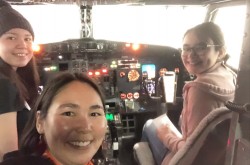
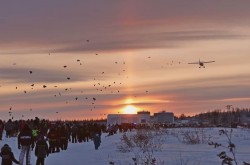
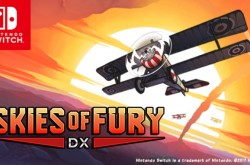
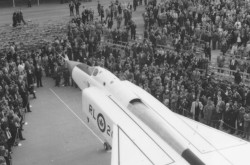
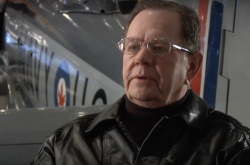




![A block of photographs showing some of the people involved in the bombing of beluga whales in the estuary and gulf of the St. Lawrence River. Anon., “La chasse aux marsouins [sic]. » Le Devoir, 15 August 1929, 6.](/sites/default/files/styles/thumbnail_7/public/2024-09/Le%20Devoir%2015%20aout%201929%20page%206.jpg?h=584f1d27&itok=TppdLItg)
